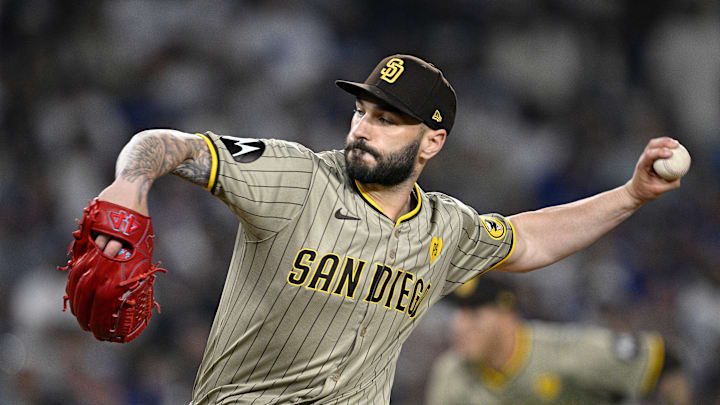The Chicago Cubs were reportedly one of the final teams standing in the Tanner Scott sweepstakes, a departure from the previous few years of roster construction in the form of a rumored four-year, $66 million offer.
It was down to the Cubs and Dodgers but its LA that adds another top arm. https://t.co/O0yLMLnJZ2
— Jesse Rogers (@JesseRogersESPN) January 19, 2025
I would be lying if I said I wasn't disappointed by the Los Angeles Dodgers swooping in and stealing a star pitcher away from the Cubs. The Dodgers' ability to continuously extend their payroll and seemingly land whoever they want is beyond the point, but there is a silver lining for the Cubs here.
As I noted, the Cubs' front office reportedly offered Scott a multi-year deal "in the ballpark" of the final $72 million pact with LA. This is a deal the Cubs haven't given a reliever since 2019 when they brought in former perennial All-Star closer Craig Kimbrel. Whether it was Kimbrel's overall poor performance for much of his tenure in Chicago or the fact the Cubs started a rebuild toward the end of his deal, the team hasn't entertained giving a closer big money since.
David Robertson was the ninth-inning man in 2022 - when the team was not realistically competing - but he was only in Chicago for a one-year pact. Adbert Alzolay emerged as the closer in 2023 and was set for the role going into 2024 before crashing and burning with a serious elbow issue. Hoyer has acknowledged his previous shortcomings when it comes to building the bullpen and the team is likely going to sign one of the many closers still on the market. But none of them will command the money or long-term commitment that Scott does.
But the team opted not to pursue other top closers in the last two years, including Edwin Diaz, Josh Hader or Kenley Jansen. So why did they decide to break the trend of the Jed Hoyer era and go after Scott?
Why was Tanner Scott the exception for the Cubs?
There's probably a few reasons. For one, Scott is a rare talent who has arguably been one of the best relievers in baseball over the last two seasons. From 2023-24, Scott owns an impressive 2.04 ERA, 35 holds, 34 saves and 188 strikeouts. Even with that elite production, he still came at a cheaper price than Hader ($95 million) and Diaz ($102 million). Hoyer and his team know they need to improve the bullpen, but it's undeniable that the Cubs prefer looking for more affordable deals.
Another reason Scott was their guy may also have to do with an earlier offseason addition to the front office. Tread Athletics coach Tyler Zombro, who is seen as a guru in the realm of pitching adjustments and training, was brought in to assist the Cubs in acquiring and developing arms. Coincidentally, Zombro was one of Scott's coaches at the private coaching organization Tread Athletics, and he was a major factor in the southpaw's career turnaround and ascendence into stardom.
The Cubs probably had a unique set of data and information on Scott after Zombro came aboard, undoubtedly contributing to their pursuit. Unfortunately, it wasn't enough to withstand the Dodgers' unmatched roster and competitive outlook. It's hard to turn down playing alongside multiple MVPs and Cy Young contenders who are coming off a World Series championship.
But the Cubs came close and it's a good sign moving forward. Zombro may be breaking through Hoyer's resistance to spending money on relief pitching by providing unique information to the Cubs' front office. Spending money aside, Zombro will also give the Cubs an advantage when it comes to signing new players and helping current ones make adjustments.
The problem is that it's unclear who the team will pursue next given the current market, which doesn't feature any other Tread Athletes, let alone any with the same abilities as Scott. There is still time to pivot to another closer, like Kirby Yates, Kenley Jansen or Kyle Finnegan. Yates and Jansen can likely be persuaded to take one-year deals since they are in their late 30s and come with much more injury risk. Finnegan or Carlos Estevez would be great options for a multi-year deal to help bolster the back of the pen, but they are not on the same level as Scott.
In any case, it seems like we will get some kind of bullpen addition because the payroll can handle it and the front office needs to stabilize this area of the roster. After moving most of Cody Bellinger's $27.5 million contract and signing all of their arbitration-eligible players, the Cubs are still sitting around $40 million below the first luxury tax threshold.
It's unfortunate the Cubs weren't able to land Scott, but the fact they were in the running and willing to risk that much capital on a reliever is a good sign.
